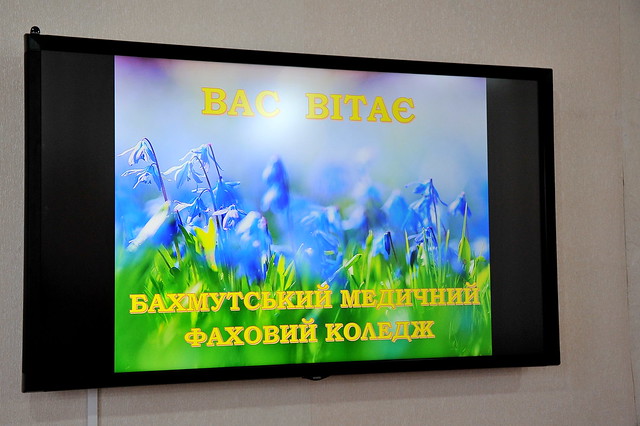Training in newly established speciality of emergency medical technician opens new horizons for ambulance drivers
Photo credit: Vitalii Shevelev / UNDP Ukraine
Yevhen Yurchenko, 36, has been working as an ambulance driver for four years. Over that time, he has been on a journey of professional development that has radically changed his life and work, and gained fulfilment from the results he has achieved.
Before becoming an ambulance driver, for more than ten years Yevhen worked as a locksmith and mechanic – first in his hometown of Rovenky in Luhansk Oblast, and then later in Sloviansk, Donetsk Oblast. Yevhen recalls that he always wanted to work in another field, doing something to benefit people. So in 2017 he got a job as a driver at an ambulance station in Sloviansk.
“I liked this work right from the beginning,” Yevhen says. “Here I can not only help people, but also learn something new every day. Every change, every challenge – teaches you something new. You’re no longer standing still, but are constantly improving.”
With the outbreak of the COVID-19 pandemic, Yevhen’s personal and working life changed dramatically. The burden on ambulance workers, both psychological and physical, increased. There were more and more challenges, and the work required increased care and vigilance for one’s own health and safety.
“We tried to double, even triple, the protections of the safety of the whole team, and of the relatives and friends who were waiting for us at home,” Yevhen says. “Every driver, paramedic and doctor were worried: If they suddenly fell ill, who would work then?”
Yevhen says the changes caused by the pandemic affected his work across the board. As the number of calls increased, it became much more challenging for crews to cope. Sometimes crews couldn’t even get back to their stations, they were so crowded, and getting used to working a whole shift in a protective uniform was especially difficult.
“Every call is emotional in its own way,” says Yevhen. “For instance, when you are called to collect a mother in labour, you realize that you’re contributing to the birth of a new person. However, some calls can really get to you. Sadly, sometimes people do not appreciate the work of ambulance crews, and they insult us, and swear at us, instead of thinking about our situation.”
Yevhen still wanted to improve, however. So as soon as he heard about the opportunity to undergo professional training as an emergency medical technician, he immediately signed up for course. As part of the first class of cadets, Yevhen completed a three-month training course at the Bakhmut Medical-Vocational College and is now qualified to provide emergency medical care as a paramedic.
“I believe such training opens new horizons for emergency medical drivers,” Yevhen says. “This is a new profession, with new requirements. I’m glad that today we, the drivers, are full members of the team. We can help paramedics and doctors, because now we clearly understand how care is provided, and especially how to use special equipment. Moving towards professional development, gaining new professional knowledge, acquiring skills – this is significant for each speciality,” Yevhen adds.
The training, and the equipping of the Emergency Medical Technicians Centre at Bakhmut College with mannequins, consumables, furniture, computers and distance learning equipment, was carried out under the UN Recovery and Peacebuilding Programme, with the financial support of the European Union.
Background
The United Nations Recovery and Peacebuilding Programme (UN RPP) is being implemented by four United Nations agencies: the United Nations Development Programme (UNDP), the UN Entity for Gender Equality and the Empowerment of Women (UN Women), the United Nations Population Fund (UNFPA) and the Food and Agriculture Organisation of the United Nations (FAO).
Twelve international partners support the Programme: the European Union (EU), the European Investment Bank (EIB), the U.S. Embassy in Ukraine, and the governments of Canada, Denmark, Germany, Japan, the Netherlands, Norway, Poland, Sweden & Switzerland.

Text: Vlada Soloviova. Editing: Yuliia Samus, UNDP Ukraine

 Locations
Locations



